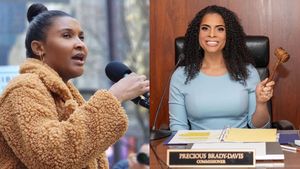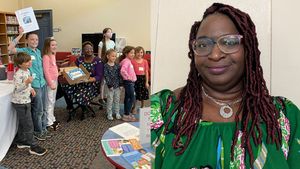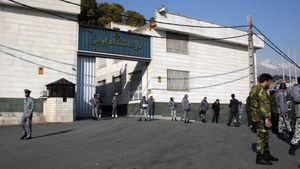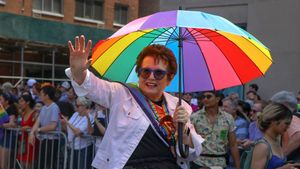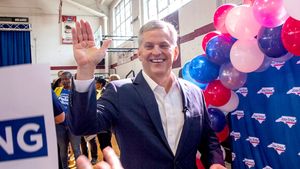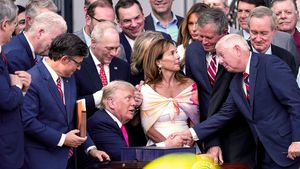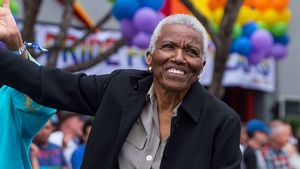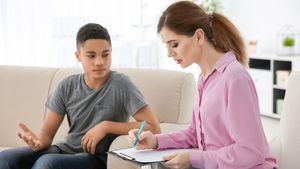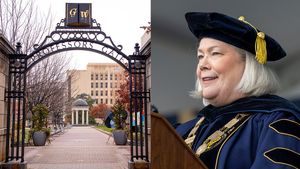Tatiana Maslany is known for shape-shifting--and playing queer--in her Emmy-winning role(s) in the clone-themed series Orphan Black. In the new short Apart From Everything-- directed by her best friend, gay actor and filmmaker Ben Lewis--Maslany takes on a new transformation, playing Fran, an alcoholic lesbian struggling to reconnect with her ex-fiancee, Lana (Tattiawna Jones), and her brother, Rob (Sergio Di Zio). "Ben gave me three novels to read about alcohol and addiction," Maslany says. "It was helpful, because I'm almost a non-drinker, and the concept of addiction was something I had to grow to understand. But it's a very relatable thing--it's so common, yet it's not spoken about much in our culture. It's still, oddly, a taboo. And I've experienced it within my family and my friends."
Maslany has also experienced the feeling of being an outsider. Growing up in Canada, she says she was very much the awkward, theater-kid type, and that otherness has always driven her to feel close to queer people. "Even though I'm not a member of the LGBT community," she says, "I've always felt a connection there, and a connection to my friends who are queer. Most of them are. I feel like they've always been part of my support system, and my go-to when I'm feeling vulnerable."
Apart From Everything from 1415 Films on Vimeo.
Last month, Maslany became the 2018 recipient of the Human Rights Campaign's (HRC) Ally for Equality Award, and in her emotional speech (below), she acknowledged her platform and also Lewis, who was in attendance. "It's an odd thing as an actor to be given an honor like that," Maslany says. "I get to speak all the time. But I want the community itself to be heard. So if I can help to shine any light on that, it's a total privilege for me, and I'm very aware of that position and what it can do."
Lewis, who's perhaps best known for his role as Peter on the Hulu smash The Handmaid's Tale, wrote the character of Fran with Maslany in mind, and pushed his boundaries as an artist with Apart From Everything, which makes its online premiere on OUT.com. He sat down to speak about the movie, and why it's important for him and our community at large.

Ben Lewis and Tatiana Maslany
OUT: What prompted you to make a film about an addict in recovery? What elements of that narrative, and those themes, relate to your own experiences?
Ben Lewis: I didn't necessarily set out to make a film about addiction. I just wanted to explore my own walls--the walls I put up between me and the world, and between me and my partner. Fear, anxiety, and insecurity are universal, and people cope with them in different ways. Fran uses alcohol to fortify herself against the world, and in the process she shuts out the people she loves. The character came from such an internal place--it wasn't until late in the process that I realized how much she'd been influenced by people in my life who've struggled with alcoholism. Or maybe I didn't realize how much I'd been influenced by those people. I'm still trying to unpack that, to be honest.
This movie doesn't hold the viewer's hand--it trusts the audience to piece the story together through nuances and emotions. Which films or filmmakers inspired you to use a more subtle storytelling style?
My first short film, Zero Recognition, was a sort of broad, stylized comedy, which definitely represents one side of my taste. But for this film, I wanted to try to make something intimate, raw, and queer like Andrew Haigh's Weekend or Abdellatif Kechiche's Blue Is The Warmest Colour. I wanted to challenge myself to not overwrite, and to trust that if the emotional logic felt true to me, and made sense to the actors, then the audience would get it, too.
What made Tatiana perfect for the part of Fran, and what were the rewards and challenges of directing your best friend?
I don't know if anyone has personally benefitted more from Tatiana's LGBTQ allyship than me, but the most gratifying part of her success has been watching her use her platform to share that with the rest of the world. I know how much the onscreen representation of her portrayal of Cosima on Orphan Black means to her fans, because it's how I felt the first time I saw Rupert Everett in My Best Friend's Wedding. Basically, I know her fans want to see her play gay roles because I want to see her play gay roles. And everyone knows she's a brilliant actor, but she's also an incredibly grounded, dedicated collaborator. She really influenced the subtle storytelling you asked about, because if something feels forced to her, she simply won't do it. She's allergic to falsehood. If I wanted her to do something that felt unnatural, I had to justify why I thought I needed it, and more often than not, I realized I didn't. I guess I thought maybe, because of our friendship, she might be more of a pushover. But that was not the case. She fiercely defended the truth of the character, which forced me to be smarter and make a better film.

Sergio Di Zio and Tatiana Maslany in Apart From Everything
The film suggests that Fran is a wholly identifying lesbian, whereas her ex, Lana, is presumably bisexual. Why was it important for you to add that element, as opposed to just telling a story about two lesbians with no interest in men?
I wanted to explore that conflict around Lana's sexual fluidity because it's something I've experienced in my own relationship. My husband Blake has been with women in the past, whereas I have not, and every time he used to bring it up, I'd get very dismissive. I would roll my eyes and make cracks like, "What do you want? A medal?" I realized later that the reaction had very little to do with him, and everything to do with me. I was just threatened. So when Lana shuts Fran down and says, "This is just a boring conversation and I'm done", that's basically me reading myself. [Laughs]
How did your marriage to Blake allow you to access the plans, pressures, and even pain of two queer people who are engaged, regardless of the outcome?
Blake and I actually got engaged right after I started writing the film. It was a happy time, but also really scary. Blake immediately went into planning mode--which he does beautifully and far better than me anyway--and I sort of started dragging my heels. All my normal mid-level feelings of fear, anxiety, and insecurity became really amplified, but luckily, I was able to channel them all into Fran, so I didn't self-destruct or sabotage my relationship.
Related | For Blake Lee & Ben Lewis, A Chance Encounter in the Men's Room Became an Eight-Year Love Affair
Both you and Tatiana have been heavily involved in TV. What have TV projects taught you about acting and filmmaking?
Honestly, that it's almost impossible to transcend bad material. My filmmaking career was born out of frustration that I had no real quality control over my work. I've been lucky to book a handful of great acting jobs over the years, like The Handmaid'sTale and Scott Pilgrim Vs. The World but I've never been as happy as I've been in the plays I've helped develop or on the short films I've written and directed. Plus, if you create your own work, you can work with people you love. In addition to Tatiana, this film was co-produced by my other two best friends, Lauren Collins and Mercedes Grundy.
You've showed this film at festivals. What have some of the reactions been from viewers?
We premiered at the BFI in London almost exactly a year ago and since then, we've played festivals all over the world. Since I haven't been able to attend most of those screenings, it's been amazing to get tweets from people in Germany, Denmark, Prague, Australia, and more who say how moved they've been by it. I think that speaks to the universality of Fran's struggle, and it's a great reminder that in the depth of your despair, even when you may feel totally alone, as Lana says, "You are not an island".
Addiction can affect anyone, but for any number of reasons, it affects a lot of queer people. What do you hope a queer addict might take away from Apart From Everything?
I hope they feel like it's an accurate, empathic depiction, and that it makes them feel less alone. We all make mistakes and we all hurt people we love, sometimes irreparably. Sometimes the people we hurt can't forgive us and we have to learn to love ourselves, forgive ourselves, and move forward anyway. I hope a queer addict who's watching sees that Fran, even with all her faults, is worthy of self-love--and so are they.





























